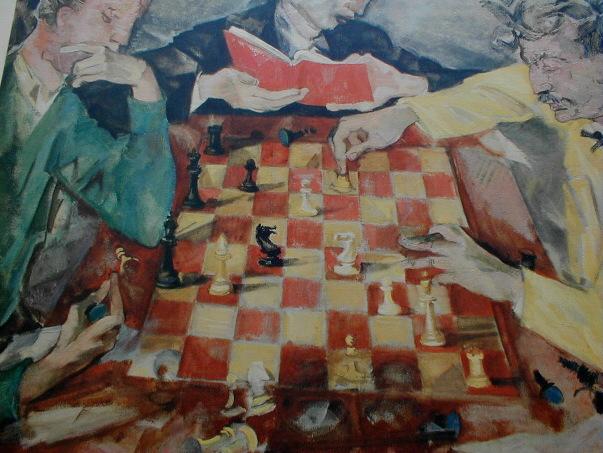Do I really have to solve the tactical exercise ?
Here is a methodology question.
It was once suggested to me that it was helpful to take a look at a tactical problem and just look at the answer. Not to spend loads of times trying to solve it. Especially since you are building recognition skills and you will repetitively see the pattern of moves that works in that position. I am wondering what other Knights think of this.
Given one hour of study per night for 3 month. Do you think it would be better to solve 15 problems a night or to run through the solutions to 60 problems a night. You would recieve a much higher exposure to a greater number of problems but would this effect your problem solving "muscle". Thoughts?
Also for my Dutch friends how do I pronounce Max Euwe last name correctly?
thanks
Jim
It was once suggested to me that it was helpful to take a look at a tactical problem and just look at the answer. Not to spend loads of times trying to solve it. Especially since you are building recognition skills and you will repetitively see the pattern of moves that works in that position. I am wondering what other Knights think of this.
Given one hour of study per night for 3 month. Do you think it would be better to solve 15 problems a night or to run through the solutions to 60 problems a night. You would recieve a much higher exposure to a greater number of problems but would this effect your problem solving "muscle". Thoughts?
Also for my Dutch friends how do I pronounce Max Euwe last name correctly?
thanks
Jim


6 Comments:
At 10:18 AM, Dave said…
Dave said…
This is just my theory, but yes I think you should. I believe there are at 3 things going on with the MDLM process.
First is simple pattern recognition. That's the part we're all aware of. Second and possibly more important is learning how to solve the problem. In a way this is related to the thought process. Finally it looks like the drills increase your stamina. Think of it as cardio training for your chess brain.
One parallel that comes to mind would be learning a new language (either spoken or computer). For most people it's not enough just to read and listen to others speak the langauge, but to practice saying the words along with them.
I haven't spoken or read German since high school (almosr 20 years ago), but I still recall those damn "repeat after me" tapes.
I'm not learning specialist, but I did stay at a Holiday Inn Express last night.
At 1:18 PM, David Glickman said…
David Glickman said…
Bablefish doesn't provide a pronunciation function, but to the best of my recollection it is "ooh-vay". But don't take my word on it - you saw what the "locals" thought of my Dutch.
At 5:44 PM, Temposchlucker said…
Temposchlucker said…
The pronunciation of DG has nothing to do with Dutch. The problem is that to my knowledge the sound of the Dutch "eu" hasn't an equivalent in English. The closest is maybe like the "e" in "person", but at dubble length.
The next "e" in "Euwe" sound like "u" in "hut". The "a" of "Max" sound as "a" in "last".
About your question: MDLM says that the first cycles are for training calculation, and the last cycles are for pattern recognition. I think he is right about that. But it would be an interesting experiment to focus on pattern recognition alone. According to Papa Polgar that should work to.
At 5:53 PM, King of the Spill said…
King of the Spill said…
Good question.
At 6:08 PM, Don Q. said…
Don Q. said…
Ideally both. MDLM suggests building the muscle first and then working on the pattern recognition. I think this is probably a good idea. Too much pattern recognition ability I think runs the risk of making you weak when you don't have a pattern.
I think the "calculation muscle" equates to stamina in sports. Pattern recognition equates to particular skills.
I have heard the correct pronunciation is "Ur-va".
At 10:45 AM, fussylizard said…
fussylizard said…
I agree w/ Don, both are helpful. Similar to MDLM's plan, I would start with fewer and work at it to improve your calculation ability and stamina. The pattern recognition is great, but if there is a pattern on the board that you don't recognize, you have to calculate it out. So I would say that better calculation offsets more patterns for quite a while. Of course you would like to have both (since often seeing a potential pattern gives you a goal to calculate towards). I think that doing the same problems over and over helps in that regard.
Regards,
Chris
Post a Comment
<< Home